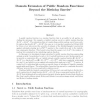Free Online Productivity Tools
i2Speak
i2Symbol
i2OCR
iTex2Img
iWeb2Print
iWeb2Shot
i2Type
iPdf2Split
iPdf2Merge
i2Bopomofo
i2Arabic
i2Style
i2Image
i2PDF
iLatex2Rtf
Sci2ools
111
Voted
CRYPTO
2007
Springer
2007
Springer
Domain Extension of Public Random Functions: Beyond the Birthday Barrier
A public random function is a random function that is accessible by all parties, including the adversary. For example, a (public) random oracle is a public random function {0, 1}∗ → {0, 1}n . The natural problem of constructing a public random oracle from a public random function {0, 1}m → {0, 1}n (for some m > n) was first considered at Crypto 2005 by Coron et al. who proved the security of variants of the Merkle-Damg˚ard construction against adversaries issuing up to O(2n/2 ) queries to the construction and to the underlying compression function. This bound is less than the square root of n2m , the number of random bits contained in the underlying random function. In this paper, we investigate domain extenders for public random functions approaching optimal security. In particular, for all ∈ (0, 1) and all functions m and (polynomial in n), we provide a construction C ,m, (·) which extends a public random function R : {0, 1}n → {0, 1}n to a function C ,m, (R) : {0, 1...
| Added | 07 Jun 2010 |
| Updated | 07 Jun 2010 |
| Type | Conference |
| Year | 2007 |
| Where | CRYPTO |
| Authors | Ueli M. Maurer, Stefano Tessaro |
Comments (0)

